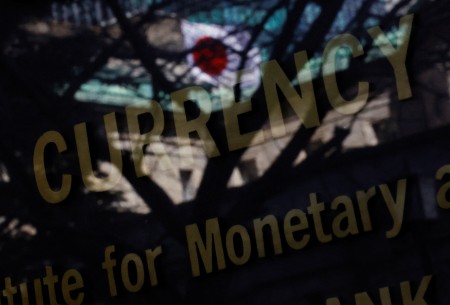(Reuters) – The Bank of Japan kept interest rates unchanged on Friday but said it would trim bond buying in the future to allow long-term interest rates to move more freely.
At the end of its two-day policy meeting, the central bank said it would continue to buy government bonds at the current pace for now. But it said it would present a specific plan to trim purchases for the next one to two years at a subsequent policy-setting meeting in July.
Yields on government bonds fell on the news, while the yen hit one-month lows against the dollar.
QUOTES:
TAKAYUKI MIYAJIMA, SENIOR ECONOMIST AT SONY FINANCIAL GROUP, TOKYO
“Today’s decision suggests that the BOJ is very careful about reducing the bond buying amounts, which means the central bank is also cautious about raising rates. It has become less likely that the BOJ will raise rates in July.”
CHRISTOPHER WONG, CURRENCY STRATEGIST, OCBC, SINGAPORE
“JPY suffers after BOJ was perceived to be in no hurry to normalise policies. It is likely that USD/JPY may challenge its previous high at 160 and that should see heightened risks of intervention. But intervention is at best an option to slow the pace of depreciation and not a tool to reverse the trend.
“For USD/JPY to turn lower more meaningfully it would require the kindness of the greenback or for BOJ to signal an intent to normalise urgently. None of this seems to happen and the path of least resistance for USD/JPY is to the upside.”
HIROFUMI SUZUKI, CHIEF FX STRATEGIST, SMBC, TOKYO
“It is a surprise that no decision was made on the reduction of bond purchases this time. At the next meeting, the BOJ said it would decide on a specific plan for the next one to two years. Therefore, it is considered that the result was somewhat dovish. For the FX market, this is likely to be a cause of the yen’s depreciation.”
MATT SIMPSON, SENIOR MARKET ANALYST, CITY INDEX, BRISBANE
“The BOJ announced they would trim bond buying ‘in future’, sending JGBs spiking higher to suppress yields and the Japanese yen.
“Prices pierced the May high with ease, yet the market is clearly keeping a close eye on the most recent ‘MOF intervention’ level. Remember, the MOF claims to not focus on the exchange rate level – but they do keep an eye on levels of volatility. Should the yen depreciate too quickly for their liking, they’re more likely to intervene.”
YOSHIMASA MARUYAMA, CHIEF MARKET ECONOMIST, SMBC NIKKO SECURITIES, TOKYO
“I believe there was not enough time for the BOJ to discuss the tapering bond-buying plan. Naturally, the market was disappointed, but I think what the BOJ is trying to do is a logical and fair process for moving towards quantitative tightening.
“The communication between the BOJ and the market had not been going well, but it was good that the BOJ laid out the process from the perspective of quantitative tightening.”
BEN BENNETT, ASIA-PACIFIC INVESTMENT STRATEGIST, LEGAL AND GENERAL INVESTMENT MANAGEMENT, HONG KONG
“It’s no surprise that they kept rates unchanged – that was very much anticipated.
“They have indeed announced an intention to reduce bond holdings, but we have to wait until their next policy meeting for details. And of course, plenty of things could happen between now and then. So the initial market reaction has been for lower yields and a weaker yen. Equity markets should like this combination of less hawkish policy and a weaker yen.”
YEAP JUN RONG, MARKET STRATEGIST, IG, SINGAPORE
“…there is bound to be some disappointment with a delayed move from the central bank, which once again highlights its more patient stance in terms of policy normalisation. More clarity is also presented, with guidance that markets can expect a more detailed plan on bond tapering at the next meeting, and reduction timeline over the ‘next one to two years or so’ does not signal much urgency and points to a more gradual pace of unwinding.
“That paves the way for Japanese equities to move higher and the Japanese yen to weaken, with relief that policy steps taken will be more measured. That will probably offer markets with a dovish takeaway from the central bank and some acceptance from authorities for a weaker yen to provide continued support for the economy, which give the green light for markets to resume finding traction in yen carry trades.”
TONY SYCAMORE, MARKETS ANALYST, IG, SYDNEY
“The BOJ’s decision to postpone the taper of its bond-buying program today continues its slow but deliberate march towards policy normalisation. The real question is, will the currency market allow the BOJ the luxury to exit at the pace they would like, or will today’s inaction see the market gun for the April 160.20 high in USD/JPY, supported by this week’s hawkish FOMC meeting and the current risk-seeking low-volatility regime?”
SHOKI OMORI, CHIEF JAPAN DESK STRATEGIST, MIZUHO SECURITIES, TOKYO
“Quite a surprise for market participants. Less chance of BOJ hiking in July now. Rally in JGBs and receiving in swaps are going to persist for a while, and yen will likely go cheaper as a trend.
“It is possible that the BOJ got concerned about the real economy and thus felt reluctant to tighten too fast. Governor Ueda has been always worried about weakness in consumption, in my view. The Fed’s hawkish stance could have also helped make this decision.
“For yen shorters and carry trade investors, this is a very good opportunity to continue their bill trades and long USD/JPY trades, though FX investors do have to be careful about MOF again.”
NORIHIRO YAMAGUCHI, SENIOR JAPAN ECONOMIST, OXFORD ECONOMICS, TOKYO
“We didn’t expect them to reduce monthly purchases today, as the latest bond market survey showed slight improvement. One possibility was that they would do so to improve market liquidity, but the survey result showed that it wasn’t such a serious problem.
“The BOJ was not likely to react to recent yen weakness with a rate hike, because it would put them in a situation of a ‘dog chasing its tail,’ as Alan Blinder said. If they had reacted, then the market would expect them to do the same the next time.”
RYUTARO KIMURA, FIXED INCOME STRATEGIST, AXA INVESTMENT MANAGERS, TOKYO
“The BOJ’s cautious intention to avoid the risk of a sharp rise in interest rates due to an overly rapid reduction in government bond purchases, while also seeking to promote improvements in bond market functionality, is evident in the setting of a meeting with market participants prior to formulating the government bond purchase reduction plan.
“…unless the BOJ decides on a pace of government bond reduction next month that is ‘less gradual’ than what market participants anticipate, bond investors are likely to hesitate to bring forward their assumed pace of monetary policy normalization again.”
KOHEI OKAZAKI, SENIOR ECONOMIST, NOMURA SECURITIES, TOKYO
“My first impression is that the BOJ is buying time. If the JGBs are easily reduced under such circumstances, there is a possibility of creating an environment where the markets would be under pressure from anticipation. The BOJ took measures to fend off such pressures.
“What was a surprise this time was that although a decision was to be made at the next meeting, the plan to reduce JGB purchase reduction for the next one or two years would be decided there. Rather than flexibly deciding each time, the BOJ would like to proceed with the reduction of purchases mechanically, thereby curbing any speculation linking a weaker yen to a reduction in JGBs.”
(Reporting by Reuters Asia markets team; Editing by Sam Holmes and Kim Coghill)






